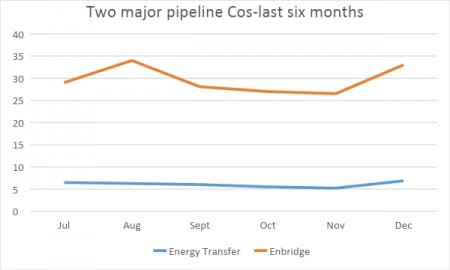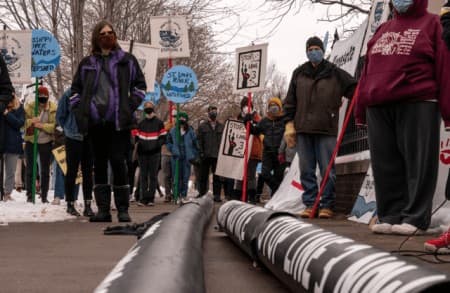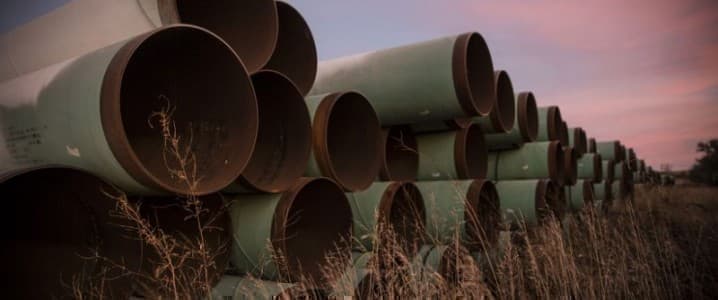It’s been a tough year for energy pipelines that carry oil and gas from source points to distribution and export terminals. In recent weeks, along with a general rally in energy-related stocks, the worst seems to have passed for the key pipeline companies upon which we rely for energy distribution in this country. Energy Transfer, (NYSE: ET), and Enbridge, NYSE: ENB) - two of the biggest pipeline operators - have seen 25% gains in the last 6-weeks.

In recent times, with the travails that have beset the pipeline business, I’ve been wondering about the intrinsic value of this crucial distribution network. As we will discuss later in this article, growth in this business has been stunted in recent times by court actions in the case of Energy Transfer and regulatory setbacks in the case of Enbridge. There has also been a perception that this business could be impaired by the decline in produced oil and gas volumes this year, which could reduce demand for their services. And, to put a finer point on the depressed valuations, what was their relationship to a realistic value on existing infrastructure?
What is the value of a pipeline that's been built and installed? And, to add another aspect, one that's is not under threat of being arbitrarily shut down by some judicial or regulatory agency? Are these companies, with huge installed bases carrying the energy we all need, being given proper credit in their valuations for the worth of their infrastructure? Recent events have left me thinking there is unrealized value in these companies. We will discuss a relative basis for valuing this hardware that was set recently by none other than Warren Buffett with his purchase of the pipeline assets of Dominion Energy, (NYSE: D).
Building a new pipeline? Not in my backyard!
I can't think of a less appealing job, frankly, than taking on the permitting and construction of a new pipeline. And I am an old mud engineer (ask anyone on a drilling rig whose fault any problem is. It's always the mud!). As soon as you announce a new one, Indigenous tribes and regulators are going to have you dead in their sights. A pipeline is the ultimate, Not In My Backyard-NIMBY project. No one wants to be able to see one. There is always the human risk of an explosion and contamination of drinking water supplies etcetera.
Related: Oil Falls After OPEC Slashes Q1 2021 Demand Forecast

Apparently, the people who run pipeline companies are starting to agree with me. This year, as much as 30% of the original CAPEX dedicated to building pipelines has been deferred or canceled, according to a recent WSJ article. Some of this is probably a lessening need for some of this infrastructure that was planned a few years ago, when the energy market was roaring, and all you heard was "takeaway capacity limitations." It's also likely a case of fatigue at fighting every mile in court.
In addition to the problems mentioned above with Energy Transfer’s Dakota Access Pipeline and Enbridge’s Line 5 under the Mackinac, there have been a number of well-publicized cases of pipeline operating companies doing just that - giving up. An article in Reuters called it the "end of an era." One prime case of an operator having spent major bucks and years of time trying to get a pipeline permitted is The Atlantic Coast Pipeline that was being built jointly by Duke Energy, (DUK), and Dominion Energy, (D) to carry West Virginia gas to the East Coast markets. After 7-years, they just threw in the towel. Here's a choice comment from the Reuters article-
“The latest setbacks have increased the difficulty for developers of billions of dollars’ worth of pipeline projects in getting needed permits and community support. The oil industry says the pipelines are needed to expand oil and gas production and deliver it to fuel-hungry markets, but a rising chorus of critics argue they pose an unacceptable future risk to climate, air, and water.
Any company that is going to look to invest that kind of money into our infrastructure is really going to have to take a hard look,” said Craig Stevens, spokesman for Grow America’s Infrastructure Now, a coalition comprised mainly of chambers of commerce and energy associations.”
As noted above, Dominion Energy was so put off by the seven-year struggle that within a few days they announced the sale of their midstream business to Berkshire Hathaway, (NYSE:BRK.B). You have to ask, what was Berkshire - which already was in the midstream business - doing shelling out billions for a pipeline company?
It was cheaper than building one, way cheaper!
Buffett has a reputation for spending his money fairly parsimoniously. Meaning he buys good companies when they are cheap, and famously, rarely sells them. I think there are two things that Warren Buffett (WB), likes about the pipeline business. One, it's a tolling business with long-term take or pay-type contracts and without nominally much exposure to commodity prices, although as we have seen those chickens will eventually come home to roost. And, as WB has told us previously, he likes businesses where he can just collect fees.
Related: Do Not Buy An Electric Car For Christmas Until You Have Read This
Something else a savvy old investor like Warren would figure out is that it's not easy, or perhaps even possible, to replicate oil and gas transmission hardware that exists today. Let's say Warren paid ~$10 bn in cash and debt for the assets of Dominion. For that, he got 5,500 miles of permitted pipeline. If you do the fourth-grade arithmetic, that's about $1.8 million a mile. I am not an expert on building underground pipelines, but that sounds really cheap to me. It must have sounded cheap to WB as well.
So, yes I am going to say that companies like ET and ENB have assets that are currently way undervalued by the market, just on replacement cost. What else should we be thinking about?
The political environment is shifting
We can all acknowledge that the last four years has been favorable toward business. Particularly dirt-moving high profile business like pipelines. It is certainly fair to say the pipeline companies have had a friend in the White House. That looks like it's going to change, with an incoming administration that has an entirely different mindset.
It was noted in the WSJ article that in some measure Trump's advocacy actually worked against these companies by fueling court challenges to rubber-stamped administration approvals that may have stood on shaky ground legally.
The ET saga with the Dakota Access Pipeline certainly comes to mind. Much has been written on this situation and as of this writing, we are still waiting for a conclusion. Its fate is in the hands of a federal judge who has twice ruled unfavorably toward the company. Currently, the judge has ordered the Army Corp of Engineers to do a complete EIS review, something the Trump administration had short-circuited. If the DAPL is eventually shut down it will cost as much as $10 bbl to rail crude being exported out of the Bakken to refining capacity in Eastern Illinois.
So what is the value of the DAPL? Just on additional crude costs alone, it's huge. So far the Bakken is on track to export 425 mm barrels of crude through YE 2020. At $10 bucks a barrel, that is an additional cost of $4.3 bn.
ADVERTISEMENT
The fact that new pipelines may just be more expensive, or even impossible to build is going to have an impact on the value of existing infrastructure.
Your takeaway
One thing about implied valuation is, you can't ever tell when the market is going to assess it or take it away. Currently, Energy Transfer has 90,000 miles of oil and gas pipeline infrastructure in place. Let's use what WB paid for Dominion's assets, $2.0 million a mile. Doing the 4th-grade multiplication gets you to 180 billion for ET’s installed assets, a far cry from ET’s capitalization of $18.9 bn.
What is the EV of the company today? The market cap is $18.9 bn and the debt is around $40 bn, so say +/- $58 bn, still way less than what WB paid for Dominion’s assets. On that admittedly skimpy arithmetic, you can see the assets of ET are way undervalued by the market. What sort of unit price would come close to reflect the value of this hardware? With 2.7 bn units outstanding an increase to $67 per unit would be needed to reflect the value of installed pipelines, again, at $2.0 million per mile.
You could play the same game with ENB and it would come out the same. The market is currently valuing these companies like their hardware comes for free. And, we know intuitively, that just doesn’t happen in the real world.
As markets tighten in the energy space generally in the coming year, and some oil and gas developments are "stranded" for lack of takeaway capacity, there could be some upward push for the patient and long-suffering investors in these under-valued energy infrastructure companies.
By David Messler for Oilprice.com
More Top Reads From Oilprice.com:
- World Oil Demand Hits Two-Month High
- The Top U.S. Shale Gas Basin Continues To Bleed Cash
- Rig Count Sees Largest One-Week Increase Since January


















I agree though there will be a lot of regulatory work ahead. Make no mistake though US reliance on coal for baseload power has been absolutely crushed by the boom in combined cycle cogeneration as well as of course nuclear and hydroelectric power. Plus there is Mid-American Energy Partners which is a massive player in wind generation...a type of power well suited for the US Carolinas both North and South.
Dominion asset is valued less than a third of its enterprise value.